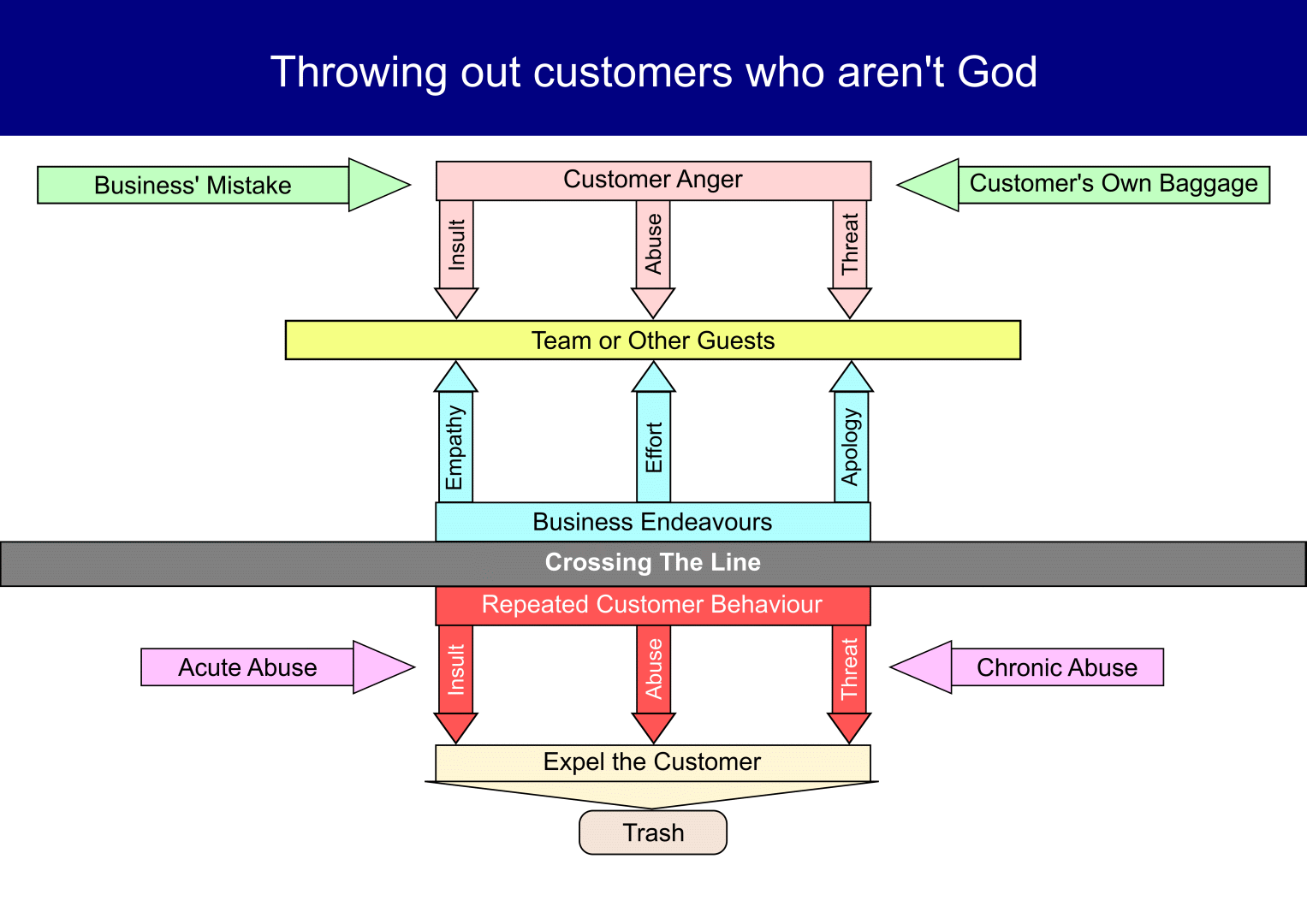Throwing out customers who aren’t “God”
When Prabhakar, one of the most customer centric managers I know, told me that one of our fairly regular guests at the restaurant had turned rogue and that our team, who knew her well, just didn’t know how to deal with her any more – it certainly got my attention.
I learnt that on each of her last half dozen visits, she had claimed that we’d been repeatedly disappointing her. Still, she continued to patronize us on the pretext of giving us more chances while bullying our staff and demanding a discount on every single visit. This time she’d completely lost it and had stormed out dramatically without paying her bill at all.
I watched the CCTV footage which showed her with an accompanying guest who was visibly embarrassed at her not paying the bill. Her guest, who clearly disagreed with her stance, offered to pay for the meal herself, but our friend stopped her from doing so. I played back the footage only to see our staff members squirming at the entitled, rude and unfair manner in which she behaved, while her guest looked on helplessly. Prabhakar and I knew we had to bring this to its logical conclusion. We agreed that the next time she visited, we’d ask her to pay her last bill, failing which she’d no longer be welcome at our restaurant.
It wasn’t long before she visited again, this time with another friend. To avoid embarrassing her in front of her guest, Prabhakar took her aside and with all the courtesy extended to our regulars, requested her to clear her dues before we seated and served her. She declined, and so he proceeded to very politely and definitively tell her that since at each visit in the recent past we’d been unable to deliver on her expectations, it would be best that she took her business elsewhere and that we would not be in a position to serve her any-more.
Stunned for a moment, she soon gathered herself and stormed out once again, this time for good. Our full-house of guests and their happy banter stood testimony to the fact that we were delivering rather adequately on our brand promise on most occasions.
While I support the sentiment that our customer is God, a giver of life so to speak, of the business; unreasonable jerks like this are bad for business and must be expelled.
Crossing the line
Anyone in customer experience knows that a customer’s anger stems either from a mistake made by the business that served him, or from some emotional baggage that he himself may have carried into the premises from the outside. Either way, it is only human for a customer who’s upset to let off some steam on our team or on other guests at times. It is also normal once in a while to be unreasonably demanding or badly behaved. On occasion, it also happens that a customer insults, abuses or threatens us.
Rudeness is contagious and on such occasions it is our natural instinct to respond with equal disrespect. As service professionals however, we inevitably endeavour to rise above this.
If a guest’s anger has originated due to something we’ve done wrong, we obviously try and make amends and every attempt not to lose our customer. If instead, it isn’t our mistake we still want to keep peace in the situation.
Regardless, we must respond maturely, managing human anger with compassion. Our efforts towards empathy and an apology to an enraged guest are most critical.
If despite such efforts, our customer continues to misbehave by insulting, abusing or threatening us; we must appeal to him one final time possibly like so, “Look, I’m very sorry that you had to go through this. I understand you’re upset. I’d really appreciate if you could please stop abusing us, and let’s try to resolve this together as fairly as possible.”
Abuse by a customer isn’t only the verbal or physical kind, but also the abuse of guest privilege, as in the case of the lady mentioned above. The money that a customer pays covers the product or service we offer, but not the right to abuse. Abuse in the heat of the moment may be overlooked and the guest accepted back, if you so wish.

Unacceptable behaviour
There are 2 types of abuse by a customer that are usually unacceptable, and must lead to definitive action on your part:
- Acute abuse – of the strong one-time or infrequent kind.
- Chronic abuse – which happens frequently from time to time.
In either case, the very presence of a person indulging in such behaviour results in the release of toxicity towards your team or your other guests, which of course is terrible for business. This is typically the last threshold of tolerance for even the most customer sensitive establishments.
A customer who continues to misbehave beyond this point, may be deemed to have crossed the line of acceptable behaviour and in the interest of the safety and sanctity of your enterprise, it becomes necessary to throw out such a “God”.